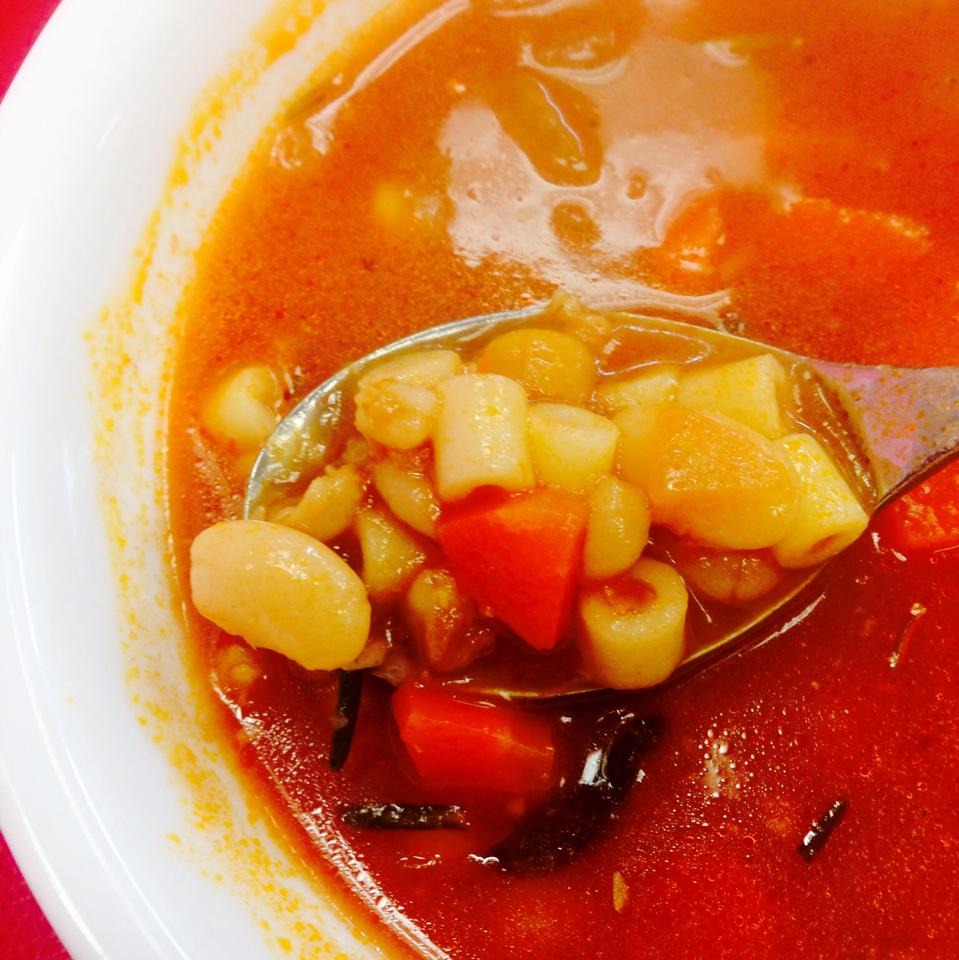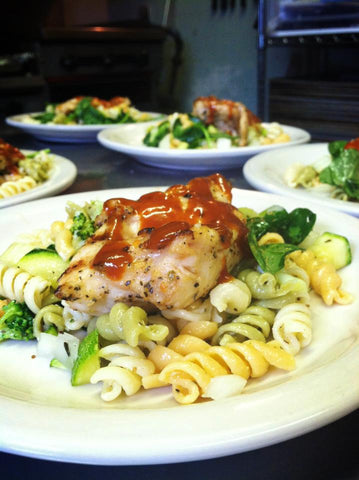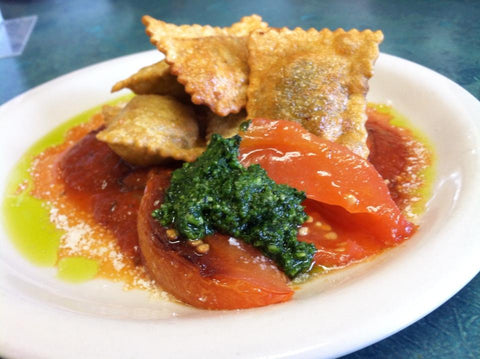
Queen of the Soup Kitchen: Diane Reeder
Mar 26, 2014
What’s a fair food budget for a family of five? What about $1.79 a day, or $0.36 per person? While few will agree on what qualifies as “fair,” no one would expect $0.36 to provide the nutrition necessary to fuel an adult or growing child for 24 hours. But 10 years ago, that’s what Diane Reeder and her family subsisted on. Waking one morning in 2003, Ms. Reeder found herself unable to move after weeks of exhaustion and debilitating headaches; the cause turned out to be carbon monoxide exposure. With an infant, an 8-year-old and a teenager at home, she and her husband did not have the luxury of pulling the covers over their heads and hoping it would all go away. Their tale of woe is as typical as it was tragic. A dual-income family, the couple watched their foothold in the middle class slip away after her unforeseeable medical complication. The Reeders’ medical bills piled up as Diane had to undergo intense physical therapy to regain full mobility. And while Jay Reeder owns his own business in Kingston, a custom-made Renaissance wear specialty shop called Knightly Endeavors, and can afford to cover many of their expenses, the family depended on Ms. Reeder’s income to pay for food. After taking care of their primary bills, the family had $25 every two weeks for food; just enough to disqualify them from food stamps. “We didn’t qualify for food stamps because Jay made $11 too much,” Ms. Reeder remembers. “We did qualify for WIC [Women, Infants and Children, a government food program for families] but only for specific types of food. [Through WIC] we had access to tons of milk, corn and baby formula, but I wanted to breastfeed Olivia as I had my elder two daughters and I couldn’t talk them into giving me more access to tuna or peanut butter, or other proteins.” Ms. Reeder muscled through. She slowly regained her strength through therapy, and made use of her background as a trained chef to turn whatever scraps she gathered into gourmet meals. (She has been a student at the Culinary Institute of America on and off when time and money allows since 1991, and is still working on the degree). “I would take those seven gallons of milk that we got and make our own ricotta and mozzarella cheese,” she remembers. “We also got $10 for a farmer’s market voucher once every season and I’d really capitalize on the fresh fruit and vegetables for as long as I could.” While turning a bag of dried beans and a sprinkling of herbs into a delicious, nutritious dinner for five put her culinary training to use, she quickly learned that other families on WIC were not blessed with culinary creativity. Seeing other moms feed their kids over-processed and overpriced junk food out of a sense of helplessness and inadequate education inspired her to reach out and help, despite her own lack of time and resources. “A lot of the nutritional issues we have in the country just come from a lack of knowledge,” Ms. Reeder says. “People don’t like Brussels sprouts because they ate canned versions that were boiled until the water was the same color as the vegetable. I wanted to change that, so I started working with some of the women I personally knew.” Ms. Reeder also wanted to set an example for her girls, Olivia, Caitlin and Megan, now 10, 18 and 23 years old, respectively. So she started running educational cooking and shopping classes for women who wanted to learn more about nutrition on a shoestring budget. She primarily reached out to the people of Kingston, though hungry and curious people from all over the Hudson Valley have been touched by Ms. Reeder’s programs. Her classes are a part of Share Our Strength’s Cooking Matters program, which is free to families and individuals who qualify. “We started small. We started out in home kitchens and churches,” Ms. Reeder says. “I would connect with other women on WIC and offer to teach them how to properly prepare fruits and vegetables on the cheap. Since I was also in the same position, I knew exactly what they had at their disposal.” Working from her client’s perspective made her want to do ever more for them. “In 2007 I was able to take the step of actually opening an official soup kitchen,” Ms. Reeder explains. “I decided to not take federal funding because I didn’t want anyone to have to turn over a proof of poverty to eat a good square meal. I’m also proud of the fact that we serve food created by chefs that wouldn’t be out of place in a nice restaurant.”
Known as The Queens Galley, the soup kitchen was open 365 days a year and served more than 10,000 meals a month on average by 2013. It was funded exclusively by private and corporate donations. In addition to providing meals, the Queens Galley offered educational and other support programs for hungry individuals and families. It was not only a place to get a warm meal, but also a refuge for people who were struggling to get back on their feet.
On Thanksgiving in 2013, the landlord of the Queens Galley space, who is currently in bankruptcy, served Ms. Reeder with an eviction notice. The Queens Galley served its last meal on December 12, 2013. Despite this setback, Ms. Reeder remains committed to the soup kitchen, the programs and the people of Kingston. “I was heartbroken when I got the eviction notice, especially on Thanksgiving, but it’s made me realize that we need to come up with a more permanent model for the soup kitchen so that can never happen again,” Ms. Reeder said. “I am philosophically opposed to asking for proof of poverty for a meal, but that would allow us to receive federal funding. Or, we could operate on a café model and have patrons pay what they are able to pay— or not. Many soup kitchens operate on both of those models with success.” She added, “Our board has a lot to think about, but we will figure out a way to come up with a more sustainable model.” The Queens Galley’s Board of Directors is comprised of local business owners and financial and food industry experts. They are currently considering two spaces, but it is unclear if either one will work out and if so, which model they will employ. In the meantime, Ms. Reeder is running several programs from the Old Dutch Church in Kingston, an institution she connected with when she was just getting her programs started. These include School’s Out (which delivers ready-made meals to children of working parents at drop-off locations like the YMCA during school vacations), Cooking Matters (free cooking classes for families who want to learn more about nutrition on a budget) and Root Cellar (culinary training and apprenticeships for low-income individuals who want to break into the food industry). Because many of her programs operate in fits and spurts (Root Cellar is currently on hiatus, for example), Ms. Reeder says she is able to juggle everything. All of her programs are funded by donations from individuals and companies. In addition to determining how and where The Queens Galley will be relaunched (and whether or not they will accept government donations to do so), Ms. Reeder is in the midst of growing her relatively new for-profit enterprise: The Kingston Candy Bar. The shop opened last year and operates out of a storefront attached to The Knightly Endeavors. The business of selling old-fashioned candies and ice cream is a counterweight of levity, fun and silliness to the heavy, deep, emotional work of The Queens Galley. The Kingston Candy Bar also earns Ms. Reeder a salary to fund her work with The Queens Galley, for which she is unpaid. “I just keep going,” Ms. Reeder says. “I may not know where my knives and whisks are or how we’re going to gather all of our food that’s scattered around at local businesses who have stepped up and volunteered to store food for us, but the next time there’s a snow day, we will figure out how to pull it all together and make sure kids get their hot meals. After hearing about a pair of brothers splitting a packet of uncooked Ramen noodles for lunch before our program was available, or kids showing up with nothing to eat all day but a can of soda and a bag of chips, we have to keep going.” To find out more about School’s Out and Ms. Reeder’s other programs, or to donate, volunteer and get updates on the hopefully soon-to-open new soup kitchen, check out The Queens Galley’s Facebook page. To make a financial contribution, visit this page.



Leave a comment